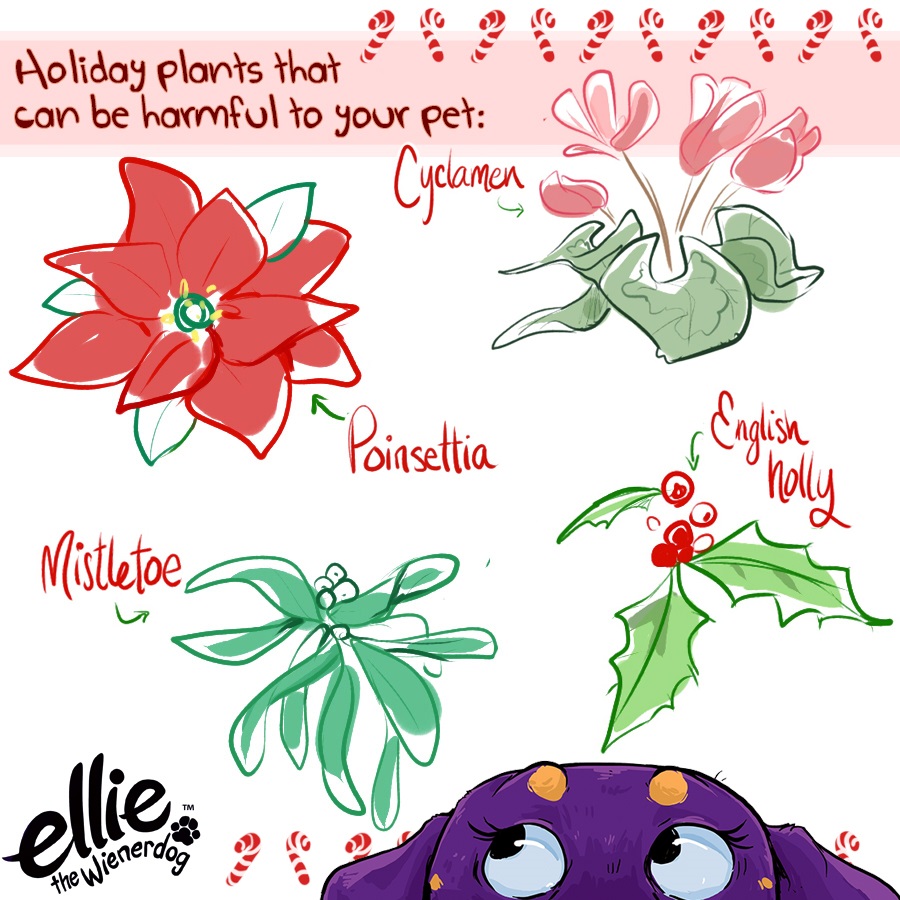It’s that time of year again and in all the hustle and bustle, it can be easy to overlook the myriad dangers that can plague your furry friends. Holidays provide unique opportunities for your furry companions to endanger themselves. We continue with Ellie the Wienerdog’s Holiday Safety Tips – Part 2 of a three-part series leading all the way up to the big day.
Last week, one of the major things we warned pet owners about was traditional holiday plants, which can make your animals sick to their stomach or even incapacitate them all the way to a fatality. Today, we want to expand upon that and offer a more complete list of holiday plants to avoid as well as what to do if your pet is poisoned.
Hazardous Holiday Plants:
- Amaryllis – Most toxic to cats, although dogs are also at risk from eating it. The bulb contains more toxin than any of the leaves or stalk. Toxicity symptoms: vomiting, diarrhea, abdominal pain, decreased appetite, tremors, kidney failure and convulsions.
- English Ivy – All plant parts are toxic. The leaves taste horrible to animals, which usually deters animals chewing. Toxicity symptoms: Inflamed mouth and stomach; in worst cases, dizziness or coma.
- Jerusalem Cherry – All plant parts are toxic; leaves and unripe fruit are the most dangerous. Toxicity Symptoms: nausea, vomiting, seizures.
- Mistletoe – Possesses high toxic potential. Toxicity Symptoms: Clinical depression and vomiting after eating, but more serious conditions can occur with larger amounts ingested.
- Poinsettia – Does not taste good so unlikely to be ingested. Toxicity Symptoms: Indigestion, vomiting and diarrhea in dogs and uncontrollable drooling in cats.
- English Holly – Does not taste good so unlikely to be ingested. Toxicity Symptoms: lip smacking, vomiting, diarrhea and depression.
- Cyclamen – Does not taste good so unlikely to be ingested; stem looks like a beet; roots contain toxin. Toxicity Symptoms: Stomach pain/distress.
- Christmas Cactus – Toxicity Symptoms: Vomiting and diarrhea if ingested.
If you think your pet has experienced toxicity or even eaten any of the plants in question, you may call the American Society for the Prevention of Cruelty to Animals Poison Control phone line at 888-426-4435. (May charge a fee for use.) Or you can call your veterinarian, but it is best to be safe than sorry. If you do call, be sure to have the following information ready to share for a faster resolution:
- What plant was eaten, including the specific part (stalk, leaf, etc.).
- How much of the plant was eaten.
- What time it was ingested.
- Your pet’s weight and age.
Your veterinarian may ask you to bring in pieces of the plant for identification at your appointment.
We hope that you have uneventful holidays and that all household members are safe and healthy, human and dog alike. Be sure to check back next week for the third part of our three-part series on Holiday Safety Tips. Ellie the Wienerdog wishes everyone Happy Holidays!
Know someone who would love this? We would love to be introduced to them! Feel free to share this on your Facebook, tweet it on your Twitter account or tag us on Instagram post using @elliewienerdog. Share for a chance to win some cool Ellie bling like bookmarks, magnets or stickers.
Related Content:
If you liked this article, be sure to check out Ellie the Wienerdog Holiday Safety Tips – Part 1 or Ellie the Wienerdog’s Favorite Peanut Butter Recipes

